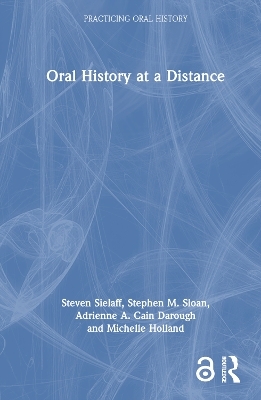
Oral History at a Distance
Routledge (Verlag)
978-1-032-07375-0 (ISBN)
Since the COVID-19 pandemic, working from a distance is now an ongoing and necessary approach in the oral historian’s toolkit. In this volume, the experienced team members of Baylor University’s Institute for Oral History provide a road map for adapting traditional best practices and procedures to this new environment while maintaining the standards oral historians hold dear. The authors present chapters on the range of oral history practice—project design, ethical considerations, project management, interviewing, technology, and preservation. While this book is always concerned with how to do remote oral history well, it also examines the changed dynamics and new considerations of moving from face-to-face projects to distance work. In this, the authors are joined by an international host of practitioners who have had their own experiences with oral history at a distance and share their insights from their work through informative case studies.
As the practice of oral history moves into a new era, this book is an essential resource for oral historians—whether they are just starting out or wanting to stay innovative in their endeavors.
Steven Sielaff serves as senior editor and collection manager for the Baylor University Institute for Oral History, editor of Sound Historian, managing editor of H-OralHist, and associate director of the Oral History Association. He is coauthor of several OHA publications including Remote Interviewing Resources, Archiving Oral History, and Oral History Metadata and Description. Stephen M. Sloan directs the Institute for Oral History and is a professor of history at Baylor University. He also serves as executive director of the Oral History Association. His publications include the coedited Listening on the Edge and Oral History and the Environment. Adrienne A. Cain Darough, MLS, CA, serves as assistant director for the Baylor University Institute for Oral History and secretary-treasurer for the Texas Oral History Association. Her research interests include ethical and legal considerations for oral history as well as community commemoration through oral histories. Michelle Holland serves as editor for the Baylor University Institute for Oral History, where she oversees transcript workflow and manages editorial student workers. She is also a rotating editor for H-OralHist and coeditor of Tattooed on My Soul: Texas Veterans Remember World War II.
Part 1: Chapters 1. Introduction 2. Project Design 3. Ethical Considerations for Remote Projects 4. Managing Remote Projects 5. Interviewing at a Distance 6. Remote Recording Technology 7. Preserving Remote Recordings 8. Looking Ahead: Final Thoughts on Going Remote 9. Afterword Part 2: Case Studies Part 3: “Oral History at a Distance” Webinar Survey Part 4: Appendix
| Erscheinungsdatum | 10.07.2024 |
|---|---|
| Reihe/Serie | Practicing Oral History |
| Zusatzinfo | 19 Tables, black and white; 16 Halftones, black and white; 16 Illustrations, black and white |
| Verlagsort | London |
| Sprache | englisch |
| Maße | 156 x 234 mm |
| Gewicht | 449 g |
| Themenwelt | Geschichte ► Allgemeine Geschichte ► Neuzeit (bis 1918) |
| Geisteswissenschaften ► Geschichte ► Geschichtstheorie / Historik | |
| ISBN-10 | 1-032-07375-6 / 1032073756 |
| ISBN-13 | 978-1-032-07375-0 / 9781032073750 |
| Zustand | Neuware |
| Haben Sie eine Frage zum Produkt? |
aus dem Bereich


